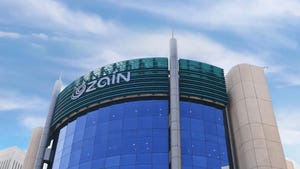Buys Honeywell's VCSEL business so it can go after one of the big component players UPDATED 5:30PM
January 26, 2004

Finisar Corp. (Nasdaq: FNSR) today announced that it will buy the VCSEL business of Honeywell International Inc. (NYSE: HON) for $75 million in cash (see Finisar Buys Honeywell VCSEL Business).
The deal is significant because it will help Finisar compete against Agilent Technologies Inc. (NYSE: A) in the transceiver market for datacom equipment. Honeywell supplies more than 50 percent of the VCSEL chips in this market. The other big player is Agilent, but it keeps all of its VCSEL production for its own use.
Honeywell and Finisar have a relationship dating back to 1996 when Honeywell introduced the first VCSEL specifically targeted for fiber optic data communications. Finisar was one of the first customers to adopt this new laser, which soon became the standard for all LAN and SAN applications. That's because Vertical Cavity Surface Emitting Lasers (VCSELs) deliver superior performance and reliability at a much lower cost than side-emitting Fabry-Perot lasers (see Laser Blazers).
For Honeywell, the VCSEL business had become a "non-core" operation, and is being cut so the company can focus on its main markets of automotive, aerospace, industrial, and military.
Finisar's aim is to be more vertically integrated. "This will allow us to compete more effectively against Agilent, which has a similar capability," said Finisar CFO Steve Workmanon a conference call this morning. "We talked a long time about how to achieve [vertical integration]," said Workman. One option was to refocus the technology acquired from startup Genoa, he said (see Finisar Acquires Genoa). When Honeywell's business came on the market, Finisar jumped at the chance to shortcut the process.
Finisar was also worried by the possibility that its key supplier of VCSEL chips could be snapped up by a competitor. "Clearly, we were concerned," Workman said.
Honeywell's VCSEL facility in Richardson, Texas, employs about 155 people. A separate sales team will be retained at the facility, to help Finisar continue to sell to Honeywell customers that also happen to be Finisar's competitors.
"We will try to build a security wall between the Honeywell group and the rest of Finisar," Workman said. "Customers need assurances that their product plans won't come back to haunt them."
Workman was cagy when asked whether Finisar was taking over a Honeywell team working on long-wavelength VCSELs, suitable for telecom equipment, in Minnesota. "We obtained a considerable portfolio of long-wavelength patents as part of this deal," was all he would say in an email to Light Reading. Larry Splett, Honeywell's director of marketing and communications, wrote: "We have retained certain rights in this area to continue to pursue long-wave research."
Splett also wrote that Honeywell's optical sub-assembly line had been moved out of Juarez, Mexico, prior to the sale. The implication is that it wasn't part of the deal with Finisar.
Last year, Honeywell's VCSEL division had revenues of approximately $36 million. Finisar accounted for $9 million of this amount.
According to market research firm RHK Inc., vendors with exposure to the datacom market, such as Finisar, Infineon Technologies AG (NYSE/Frankfurt: IFX), and Sumitomo Electric Industries Ltd. have seen the largest quarterly gains in market share in 2003 (see Optical Components Market Up 8%).
— Pauline Rigby, Senior Editor, Light Reading
You May Also Like









